How should “Christians” vote? Many pastors are outspokenly Republican and pro-life, while others encourage their congregants to live out critical race theory in their daily lives.
Pastors having political opinions isn’t new, but there seems to be a trend of biblically orthodox pastors veering away from the values based discernment in politics and, as the friction rises politically, they have opted instead for an easier emphasis on the right to the conscience of a Christian.
John Piper, a prominent theologian amongst orthodox evangelicals, recently urged Christians to not vote due to the flaws of each candidate.
David Platt and Tim Keller—two prominent evangelical voices with very similar statuses to that of Piper—took a different approach, advocating the narrative that Christians have the right to their conscience, and since the bible does not prescribe specific policy solutions, we are all free to vote Republican, Democrat, third party, or not at all. The good thing, they say, is that on Sunday we will all come back and be united under Christ.
I actually agree, and I desperately want unity in the church—not for a specific candidate, but for a specific, life-saving gospel.
Statements like “We are Christians first” or “God doesn’t vote Republican or Democrat” are 100 percent accurate. But they can also mislead the hearer to excuse their beliefs or positions. Even more dangerous, they can cause a pastor to compartmentalize political viewpoints and separate them as if they have little consequence.
Seeing this battle within pastors concerned me, so I teamed up with Texas Scorecard and Nate Fischer to conduct public opinion polling of church-attending voters to determine their theological views, political views, and voting patterns.
This research hasn’t seemed to exist until now. Much of the research of “Christian voters” includes many people who identify as “cultural Christians” but are in no way engaged in the body of Christ. It’s also important for pastors to be able to focus on shepherding the flock, and that would pertain to congregants in your church. We surveyed 823 Texas voters who are actively attending church; 82 percent of the participants attend weekly, while 18 percent attend a minimum of once a month.
If you identify yourself as a Christian but aren’t regularly attending a local church, you weren’t polled. As I break down the data we found, I’m going to refer to the respondents as “church attenders.” You’ll see in the data a truth that has existed for the entirety of the church: Just because someone attends church doesn’t mean they are a Christian.
Why is this an important distinction? Because the great commission is a call to evangelism and discipleship. Therefore, an accurate understanding of heterodox (views in opposition to orthodox beliefs) views of congregants is essential to pastoral discernment in political commentaries.
The data below reveals a clear contrast in theological views based on a church attender’s voting preference. It’s also important to point out that no candidate has a monopoly on heterodox viewpoints among their voters.
Roughly speaking, only 1 in 5 Biden voters hold consistently orthodox views that align with historical views of the Bible, while around 1 in 5 Trump voters attending church hold heterodox viewpoints.
The first question we asked these churchgoers was, “Do you believe the Bible is without error?”
This belief is central to the Christian faith. To disagree with that statement is to disagree with Christ, the apostles, and all of our church fathers. You’d also be disagreeing with pastors like Tim Keller, David Platt, and John Piper.
So, let’s see how they respond:
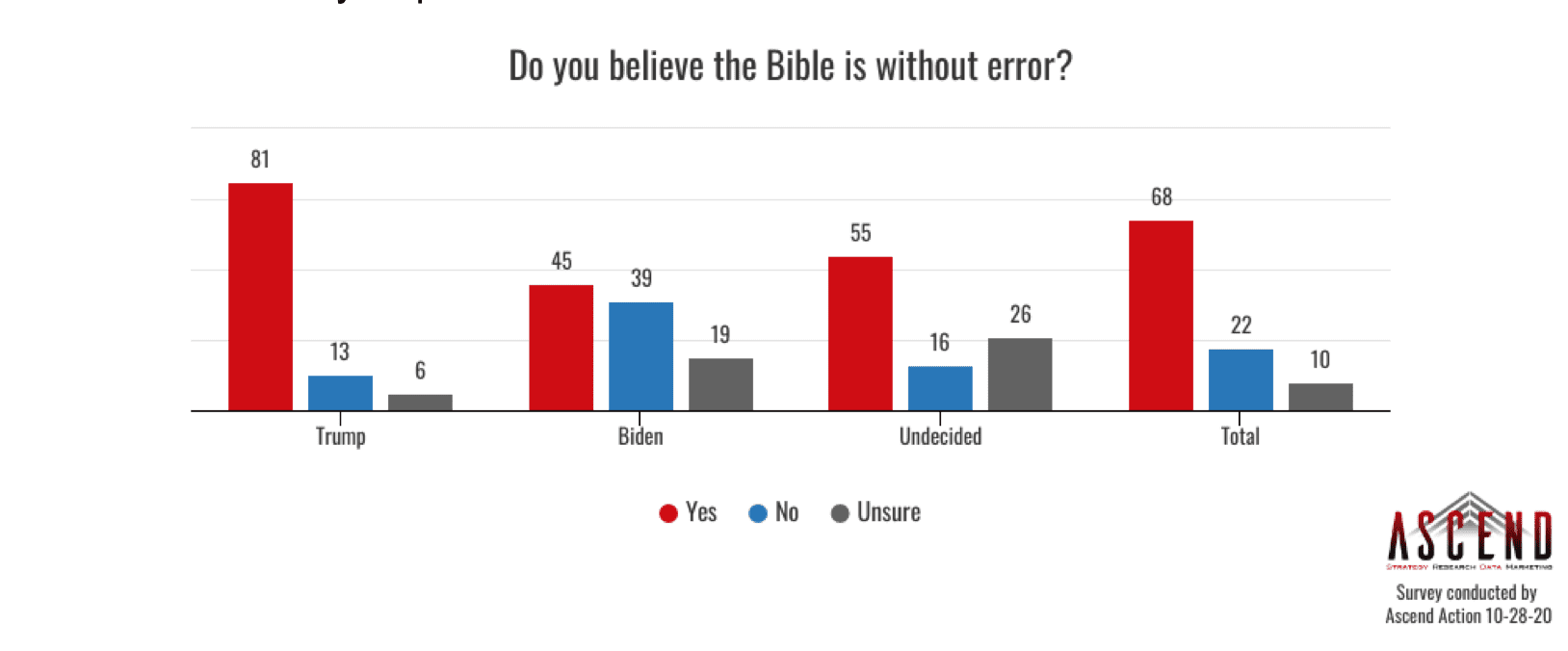
Clearly, there are both Biden and Trump voters in the church who believe the Bible is inerrant. However, the majority of Biden voters either reject inerrancy or, at a minimum, are questioning this truth. The vast majority of Trump voters are in line with this biblical teaching. It’s important to clarify that nothing in this data implies that a vote for Trump “causes” one to believe biblical teachings, but that those who hold to orthodox views are much more likely to cast a ballot for Trump, and vice versa for Biden voters.
The second theological question asks about the risk of judgment for those who reject Jesus Christ.
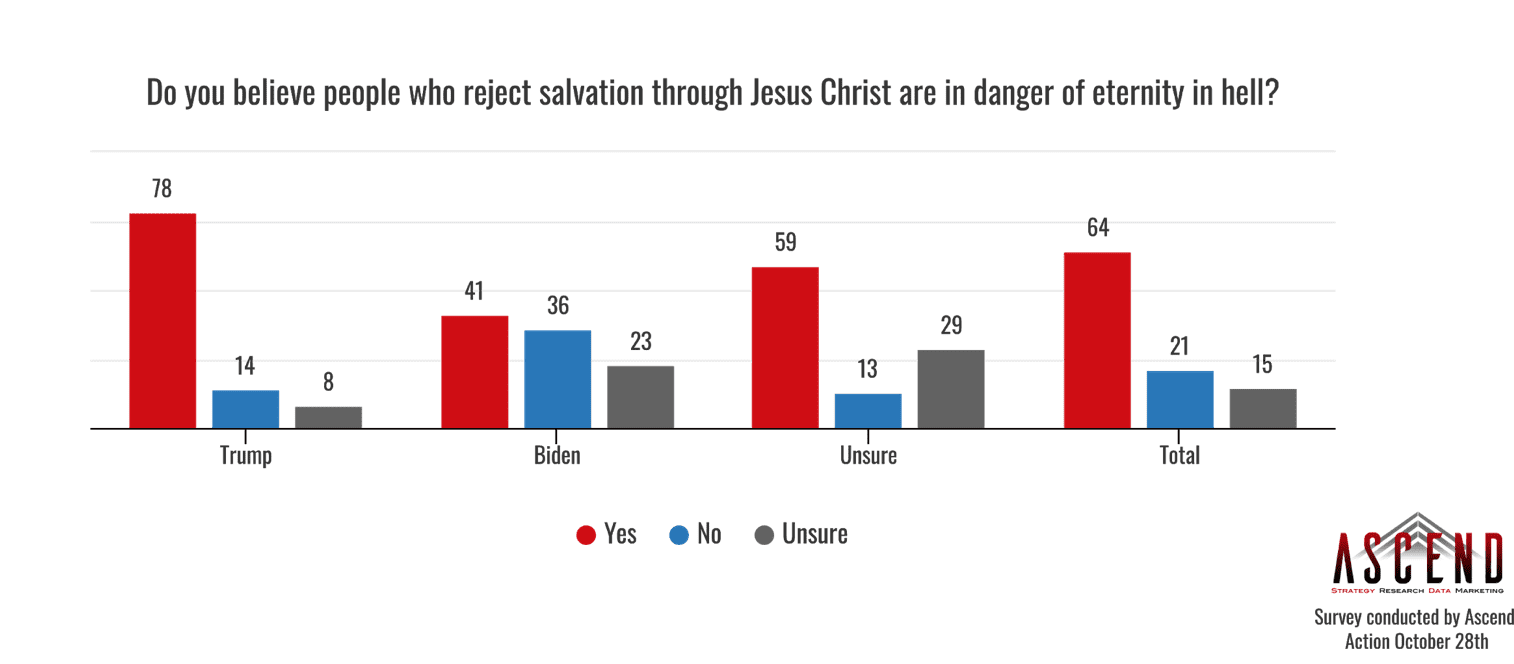
Note that this question is not asked in the most dogmatic way; “in danger of” is softer than “will.” Nevertheless, a majority of Biden voting church attendees disagree, rejecting or doubting the idea that only faith in Christ saves one from hell.
The next question we will focus on highlights a question in which both candidates’ church-attending voters most vehemently disagree with the Christian church on: the viewpoint of actively practicing gay and lesbian church leadership.
Note that this question does not ask about people who experience same-sex attraction while remaining celibate, nor about whether actively practicing gays and lesbians can be ordinary members of the church. It asks whether actively practicing gays and lesbians should be allowed to serve in church leadership. A majority of Biden voters say yes, while a majority of Trump voters say no.
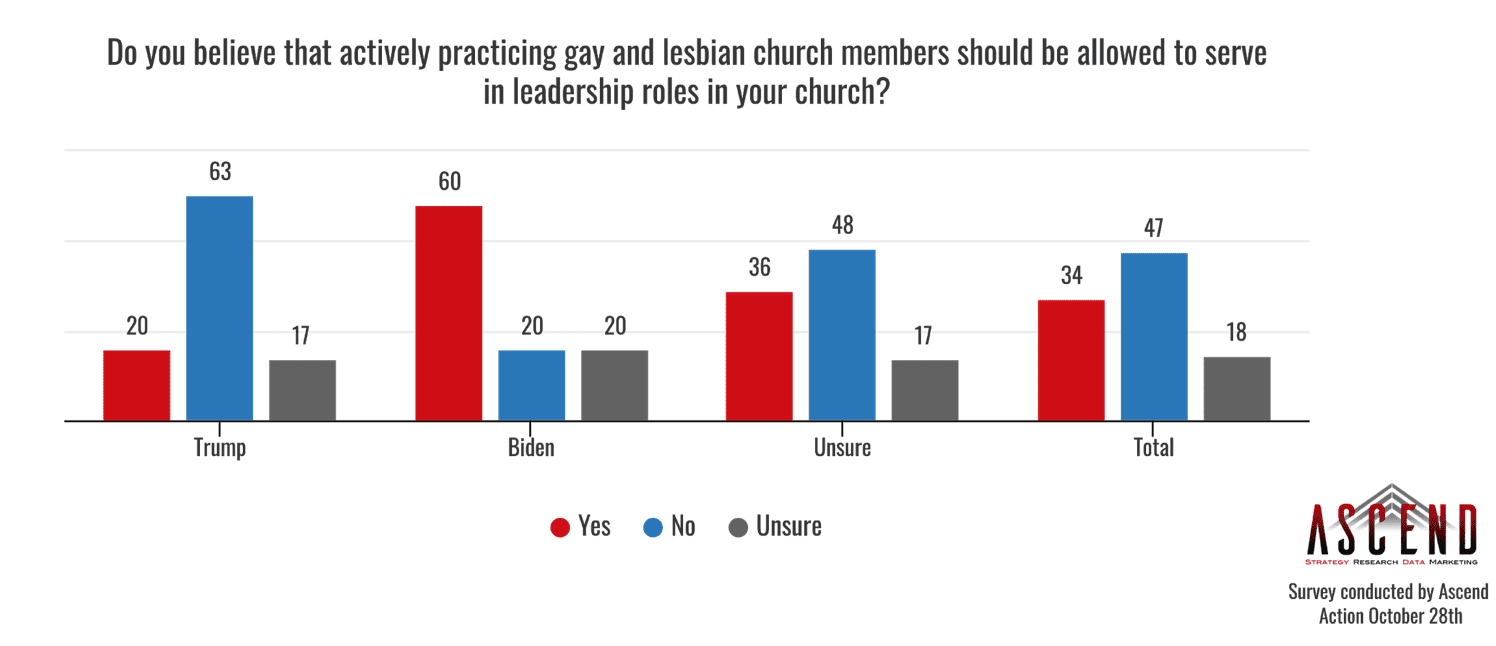
While some pastors seem most concerned with offending Joe Biden supporters in their church, data indicates they should be more concerned with the fact that a Biden voter who attends church is more likely to deny or be unsure of the existence of hell and the inerrancy of scripture than they are to hold traditionally orthodox views on those subjects.
Why is this fact important?
Because your vote for a presidential candidate doesn’t save you. Period. Christ alone saves. There will be Biden voters and Trump voters in heaven, and there will be Biden voters and Trump voters in hell (regardless of their acknowledgement of hell’s existence).
All Christians should be more concerned with the eternal consequences of our viewpoints than the political ones, and if a large swath of your fellow church members are telling you they intend to vote for Biden, they are likely rejecting—or at a minimum, dangerously questioning—biblical truth.
Because of their vote for Biden? Of course not. But is it an indicator? The data would say yes.
We also asked church attenders some basic political questions. The results below won’t surprise you, but two data points stood out. Only 2 percent of Christian voters supporting Trump believe abortion should be legal and safe, and only 4 percent of Biden-voting church attenders oppose universal healthcare, policy to the left of the presidential candidate himself.
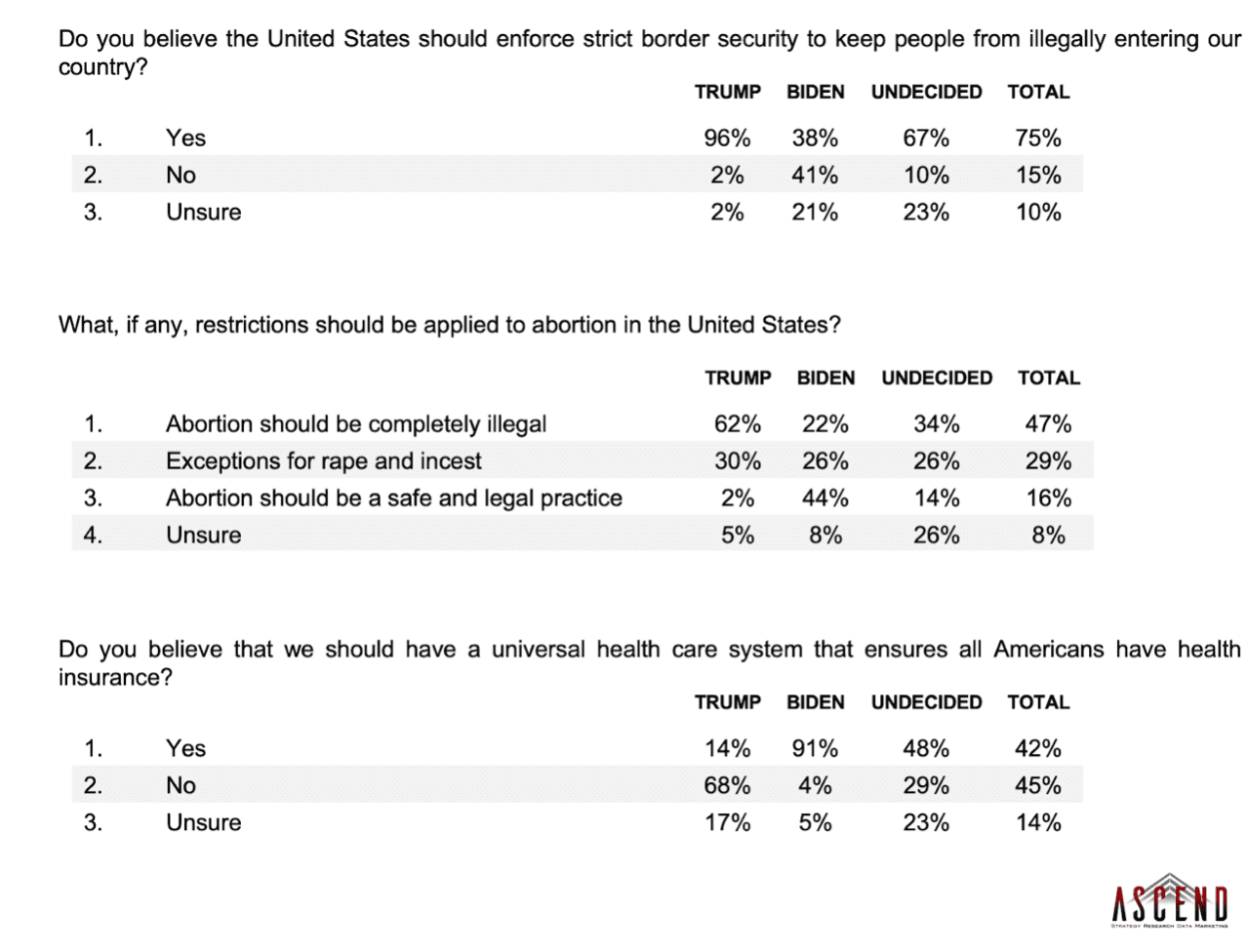
The last observation is that there is a dangerous trend you see when you break down the data by voter preference and race. Essentially the most likely voter to hold traditionally orthodox views is a black Trump voter, followed by a white Trump voter, then a Hispanic Trump voter. But the racial divide widens significantly with white church attenders compared to other races. The next most likely subset to hold traditionally orthodox views are black Biden voters, then Hispanic Biden voters, followed last by white Biden voters.
It’s a notable fact that white church attenders who vote differently on the presidential ballot are also the most clearly contrasted in their views of hell and scripture, while black voters who disagree on their choice for president are more unified in regarding scriptural teachings.
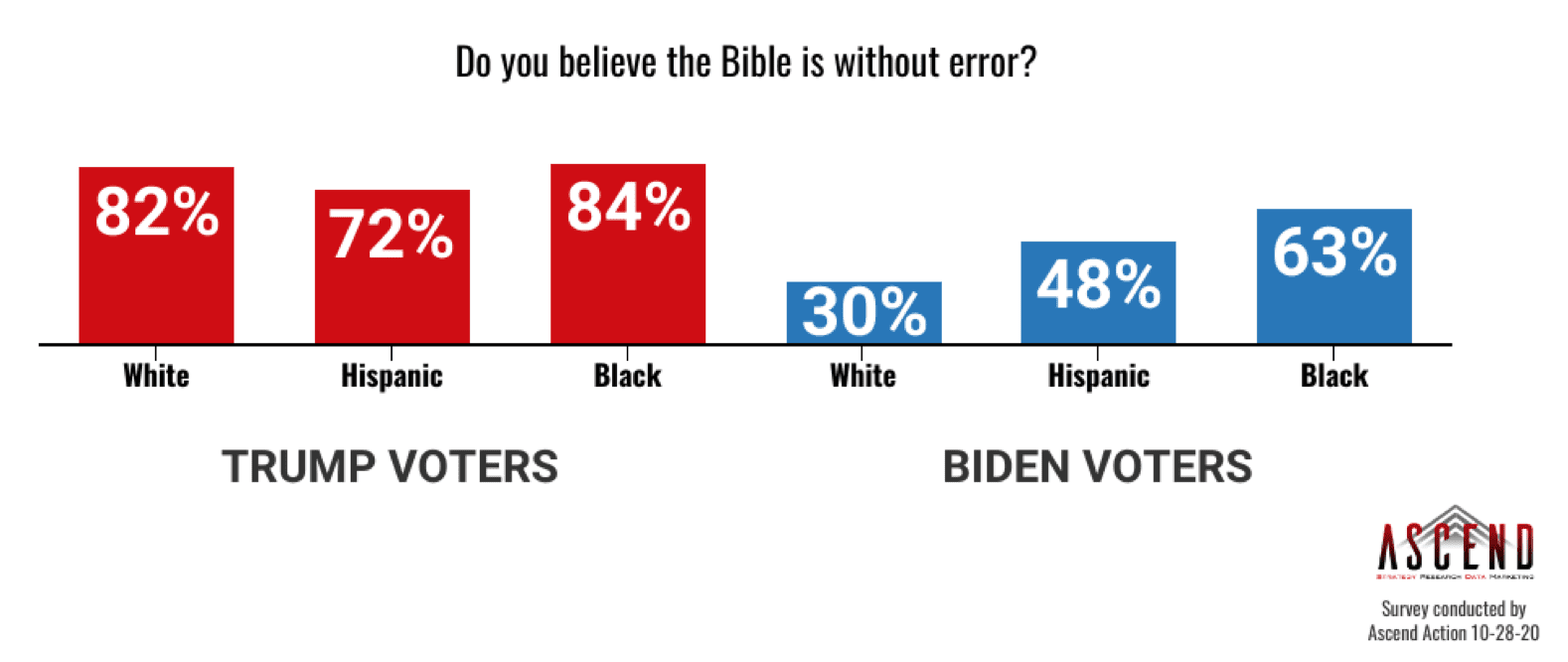
So what does this data mean? Well, you can decide that for yourself.
I want to point out something David Platt, a very prominent evangelical pastor, says in his book titled “Before You Vote.” He lays out the case that Christians can vote for Trump, Biden, third-party candidates, or not at all. He seems to say your ultimate decision isn’t that important if you go about it thoughtfully. This is very similar to a viewpoint also espoused by Tim Keller.
Christians and the freedom of conscience in politics. The Bible binds my conscience to care for the poor, but it does not tell me the best practical way to do it. Any particular strategy (high taxes and government services vs low taxes and private charity) may be good and wise…
— Timothy Keller (@timkellernyc) September 17, 2020
First, I want to acknowledge that I have personally read and learned more about the Lord through the writings of both of these men. My concern with their presentation of politics is not an indictment on their theology or a rejection of the work they have done to spread the gospel.
My dad would always tell me that where you stand on an issue is often determined by where you sit. And my perspective as a Christ follower called to the arena of politics is different than that of a New York City pastor called to shepherd a particular church.
That being said, just days after Keller spoke about the nuance in defying the Christian position for someone’s vote of policy preference, he posted the thread below:
I’ve been asked why it is especially wrong for Christians to speak of their opponents in a demonizing and dehumanizing way. Historic Christians believe that our sin has made us worthy of condemnation and hell. 1/6
— Timothy Keller (@timkellernyc) September 20, 2020
I want to take special note of the first statement:
“Historic Christians believe that our sin has made us worthy of condemnation and hell.” – Tim Keller
On this issue Keller has clarity, and I think it’s important to recognize that a majority of Biden voters in churches (at least in Texas, where we conducted this research) reject this. Please understand, the rejection of this fundamental truth has bigger implications than their vote.
If a church member or pastor has a fellow church attender proclaim their support for Biden, their first thought should not be: “How do I get this person to vote for Trump?” It might be best that their first thought is to take the conversation away from politics and instead try to talk about biblical truths the congregant is more than likely rejecting or questioning.
Again, there are Biden voters that hold orthodox views. I repeat this fact because polling is often used to make declarative statements about an entire voting block, and that is rarely the case.
Now let’s look at what Platt says in his book. On Page 65, he lays out three “biblical truths to political positions”:
Gender: God clearly made people as distinct men and women in His image. Therefore, the Christian position affirms these two genders as gifts of grace from God to be honored in every person.
Marriage: God clearly defines marriage as a monogamous union between one man and one woman. Therefore, the Christian position is that doing justice involves defending and promoting marriage according to God’s definition.
Abortion: God’s Word clearly indicates that he forms children in their mother’s womb. Therefore, the Christian position asserts that abortion is the wrongful taking of a person’s life.
Side note: Platt refrains from saying that the Christian position is that abortion should be opposed as a legal option for women, but he does call abortion “murder” later in the book.
Platt lays out several issues that are clear in scripture, which I appreciate. He then addresses the fact that there are a ton of other issues that matter, and Christians must weigh all of them together to reach the conclusion that voting in favor of a pro-abortion candidate is still the best option.
Again, I don’t believe that a Christian can’t vote for Biden, but Platt’s emphasis on this fact might be a distraction from the reality that many of those Biden voters in church pews reject biblical truth that they would say is central to the gospel. And yes, there are Trump voters who reject those truths as well.
What does unity in the church look like?
Well, first it seems, unfortunately, we have to recognize that unity for the body of Christ will always result in disunity in the church itself. Why? Because for all of church history, you have people who attend church but aren’t part of the body of Christ. The desire would be for those people to come to saving faith that leads to eternal life, but we shouldn’t be surprised that many of them will make cultural and political decisions that veer strongly from most of the body, therefore causing the appearance that the body is less unified than it actually is.
Is the church a social club where the truth of ideas is within the individual? Or is it a body of created beings with foundational truths? (Foundational truths that call us to enter the world with even more care and love for each individual created by God than if we were to come up with truth from our own experiences.)
Let’s unite in Christ and recognize that more people in your church are unaware or reject biblical truth than you think. Let us not act as if someone’s political decisions and inclinations in some way indicates their heart’s positions on eternal issues that actually matter.
We must think carefully about how we treat politics in church. All ideas and candidates are not the same.
Trump or Biden won’t save the body of Christ. The good news is we don’t need saving. Christ already did that. The bad news is many still do, and some of those people are even sitting next to you during Sunday worship.
The full poll and crosstabs of this project will be released on November 2.





